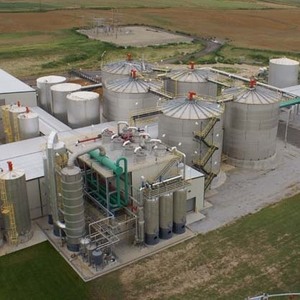Kan. ethanol plant to build renewable diesel facility on site

Photo: Prairie Horizon Agri-Energy
May 1, 2014
BY Prairie Horizon Agri-Energy
Mike Erhart, CEO and general manager of Prairie Horizon Agri-Energy, announced the formation of a partnership with WB Services LLC on May 1, to expand its biofuels footprint by integrating a renewable diesel production facility into the existing ethanol plant.
“With this announcement, Prairie Horizon continues to meet its goal of providing leadership in the renewable fuels industry,” said Erhart. “We are very excited and eager to partner with WB Services and get under construction and put this product in the marketplace.”
Advertisement
WB Services will design, construct and operate the renewable diesel plant utilizing patented renewable diesel process technology. WB Services is a renewable fuels company recognized for its experience and expertise in plant construction, optimization and management, as well as process development and engineering.
According to Ron Beemiller, president and CEO of WB Services, “This plant will be the first of its kind—the first renewable diesel plant to fully integrate into an existing ethanol operation,” he said. “This is a very exciting time for both Prairie Horizon Agri-Energy and WB Services, we look forward to working with PHAE’s exceptional leadership team on this project.”
Advertisement
Currently, Prairie Horizon Agri-Energy is a 40 MMgy nameplate ethanol plant, which began operations in 2006. With the completion of the facility, renewable diesel nameplate production will be 3 MMgy, and will also produce denaturant, fuel gas, and steam for use at the existing facility. Prairie Horizon Agri-Energy also has a significant investment in the renewable and biodiesel plants under construction by Green Energy Products in Sedgwick, Kan.
Design work has already begun, and construction is scheduled to begin mid-year.
Related Stories
The USDA significantly increased its estimate for 2025-’26 soybean oil use in biofuel production in its latest World Agricultural Supply and Demand Estimates report, released July 11. The outlook for soybean production was revised down.
U.S. fuel ethanol capacity fell slightly in April, while biodiesel and renewable diesel capacity held steady, according to data released by the U.S. EIA on June 30. Feedstock consumption was down when compared to the previous month.
The U.S. EPA on July 8 hosted virtual public hearing to gather input on the agency’s recently released proposed rule to set 2026 and 2027 RFS RVOs. Members of the biofuel industry were among those to offer testimony during the event.
The USDA’s Risk Management Agency is implementing multiple changes to the Camelina pilot insurance program for the 2026 and succeeding crop years. The changes will expand coverage options and provide greater flexibility for producers.
The USDA’s National Agricultural Statistics Service on June 30 released its annual Acreage report, estimating that 83.4 million acres of soybeans have been planted in the U.S. this year, down 4% when compared to 2024.
Upcoming Events










